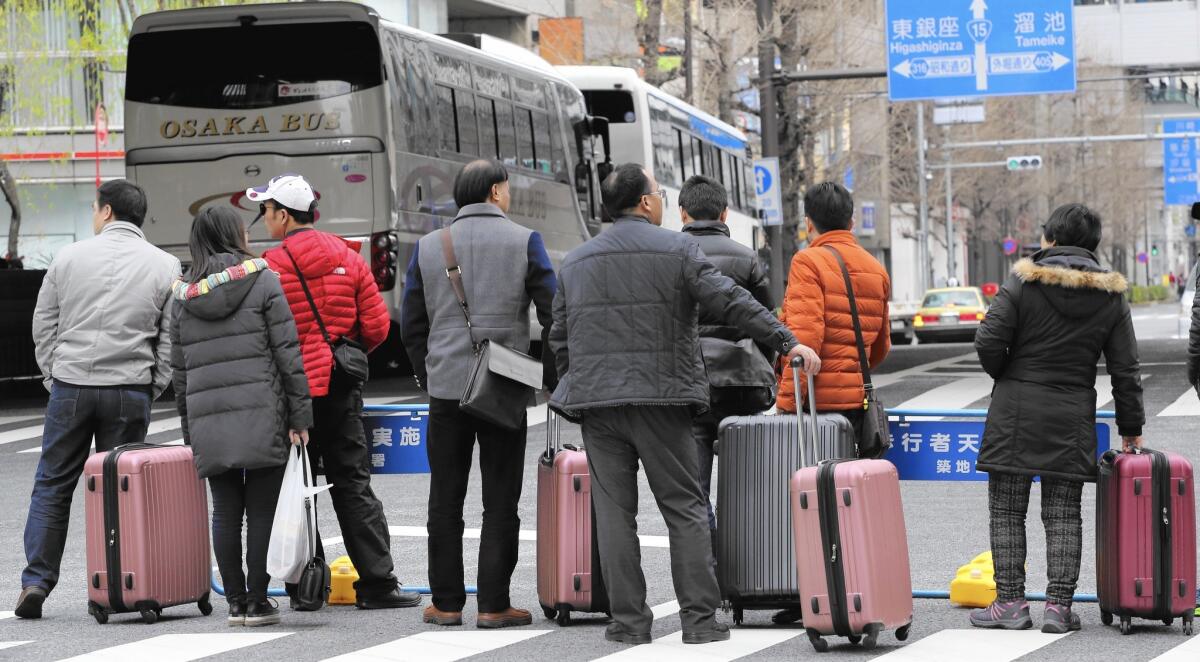On the Ground: For Chinese visiting Japan, bargains make it easier to overlook nations’ ill feelings

reporting from TOKYO — There are things Zhang Feng likes about Japan: the service, the quality products, the immaculate restrooms, even in malls and highway rest stops. There are things she dislikes, such as sashimi and left-hand traffic.
But what never crosses her mind is the intense historical antagonism between Japan and her native China dating back to World War II.
“Most people are totally ambivalent about this,” said Zhang, 32, who works for a Japanese company in Shanghai and visited the country for the first time in February, as a tourist. “Some people say they won’t buy Japanese products or go to Japan, but these people are in the minority.”
Chinese tourists have been flocking to Japan, drawn by loosening tourist visa restrictions and a favorable currency exchange rate that has enabled shopping sprees. About 5 million visited last year, up more than 100% from 2014.
It’s not that the rift between the two countries has healed — polls indicate continuing mutual hostility, a clash of cultures and a lack of hesitation by Chinese state media to revisit the Japanese Imperial Army’s brutal treatment of China in the 1930s and 1940s.
But many Chinese, in search of a good deal, have been able to look past all that.
“My standard mantra is the two stable pillars of the Japan-China relationship are tourism and antagonism,” said Jeffrey Towson, a professor of investment at Peking University.
“The antagonism seems to be the real deal,” he said. “But when the tourists are there, and they mentally calculate that these cosmetics, or that rice cooker, will cost me X here and Y back in Shanghai with all the taxes, they buy it. And if the yen drops, or the visa requirements become easier, they begin to buy a lot more.”
Although Japanese toilet seats, rice cookers and other electronics were once the most popular purchases, Chinese shoppers have more recently taken a turn toward food and hygiene products such as milk powder, spirits and even condoms.
Japanese media coined a term for the trend: bakugai, which translates to “explosive shopping.” In December, the publishing company Jiyu Kokumin Sha named it the most popular word of 2015.
“For things where quality isn’t just a nice thing, it’s essential — like milk powder — Chinese want Japanese products,” Towson said. “The irony is a lot of Japanese products are manufactured in China. They know that and they don’t care.”
NEWSLETTER: Get the day’s top headlines from Times Editor Davan Maharaj >>
The tourism boom has changed parts of Tokyo, as Japanese businesses and politicians have capitalized on the wave.
Department stores in Ginza, a famously upscale neighborhood, have begun selling products duty-free to overseas shoppers.
Matsubara Tadayoshi, mayor of Tokyo’s Ota City — a quiet district that is home to the Haneda international airport — said in an interview that he plans to install an Airbnb-style home-stay system to accommodate the recent influx of Chinese tourists. The district’s hotels are operating at more than 90% capacity, he said.
“On the other hand, we have over 60,000 empty houses and rooms,” he added. “So we have to come up with some idea of how to utilize them.”
Tadayoshi said that the government would give visitors coupons for free access to Ota’s public baths, a popular attraction.
Tourists can “use coupons at the shops, and then go to the communal baths to mingle with locals,” he said. “We call it naked communication.”
A Pew Research Center survey last year found that only 12% of Chinese expressed a “favorable view” of Japan, and only 9% of Japanese held the same view toward China.
That may have less to do with historical ills than deep cultural differences. Known for their reverence of order, quiet and tidiness, the Japanese have at times struggled to adjust to the more freewheeling Chinese tourists.
The website of a popular talk show reported that at one Kyoto apartment block, the landlord angered residents by renting several rooms to Chinese tour groups that caused late-night rackets rolling their suitcases through the hallways.
Locals in Ginza have complained about Chinese tourists “acting as if they’re in China,” the Japanese edition of Yahoo News reported. Their bad behavior — including talking loudly, squatting on the sidewalks and eating and drinking on the street — was unbefitting of the tony shopping district, the article reported.
Last month, a physical altercation between two Chinese tourists queuing at Tokyo’s Narita airport — it began when one woman bumped another’s luggage trolley — made national news in Japan.
For their part, the Chinese tourists tend to speak in glowing terms about a country that they’ve been taught to despise.
Yang Weijian, 21, who came to Japan from Dalian in northeastern China to shop with his girlfriend, said that although he had few social interactions with Japanese people during his four-day stay, he had enjoyed his experience.
“Everything is very clean and orderly here,” he said. “It’s all just completely different from China.”
See more of our top stories on Facebook >>
ALSO
‘This is a historic visit and a historic opportunity,’ President Obama says in Cuba
Home of key witness in arson attack on Palestinians also goes up in flames
New generation of more radical youth emerges in the Kurdish region of Turkey
More to Read
Sign up for Essential California
The most important California stories and recommendations in your inbox every morning.
You may occasionally receive promotional content from the Los Angeles Times.










